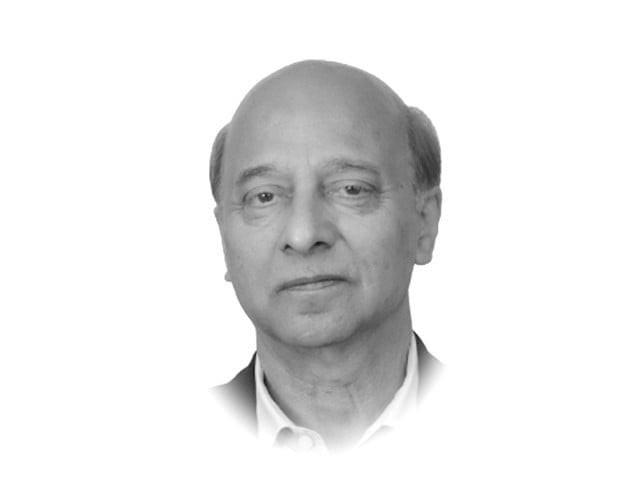Trump, Pakistan and US deep state
White House prepares to welcome Donald Trump for the second time.

As the White House prepares to welcome Donald Trump for the second time, expectations for an end to duplicitous policies and fears of big disruption in the US relations with countries across the globe are growing.
Apprehensions in Europe over Trump's unpredictability and the likelihood of truncation through reform of the mighty establishment — as Trump has promised — notwithstanding, let us consider what Trump-II may mean for Pakistan and why tens of thousands of Pakistani-Americans are looking up to him. Zalmay Khalilzad, the former special envoy, buoyed this optimism through a crisp message via X, saying Pakistani rulers would do better to reach an agreement with PTI and release Imran Khan before January 20th instead of spending money on lobbying in the US.
In contrast, a couple of days before leaving Islamabad, former ambassador Donald Blome said the US chose not to interfere in Pakistan's domestic affairs after April 2022. "This is what history also taught us," he explained. At the same time, Blome, who undertook unmatched cross-country diplomacy for improving relations between the two countries and went as far as Gwadar, hoped Pakistani stakeholders would sit together to steer the country out of the perennial state of crisis that it faces today.
As his country's representative, an ambassador can only state this much publicly - obviously based on the brief that he or she gets from the capital.
But, regardless of the motives behind Khalilzad's tweet, two instances contradict the Biden administration's position on Pakistan and are likely to guide the new administration's policy.
First, on September 22, 2023, the Department of State imposed visa restrictions on Bangladeshi individuals "responsible for, or complicit in, undermining the democratic election process in Bangladesh. These individuals include members of law enforcement, the ruling party, and the political opposition".
"These persons and members of their immediate family may be found ineligible for entry into the United States. Additional persons found to have been responsible for, or complicit in, undermining the democratic election process in Bangladesh may also be found ineligible for US visas under this policy in the future. This includes current and former Bangladeshi officials, members of opposition and ruling political parties, and members of law enforcement, the judiciary, and security services," says the official announcement.
It said the latest action represents the United States commitment to supporting free and fair elections in Bangladesh that are carried out in a peaceful manner.
In another instance, as recent as January 10, 2025, a White House spokesperson condemned and rejected Nicolás Maduro's "illegitimate presidential inauguration in Venezuela", elaborating that "Maduro clearly lost the 2024 presidential election and has no right to claim the presidency."
At the same time, the Department of State increased the reward offers up to $25 million each for information leading to the arrests and/or convictions of Nicolás Maduro and Maduro's Minister of Interior Diosdado Cabello. The Department of State is also adding a new reward offer of up to $15 million for Maduro's Defense Minister Vladimir Padrino López.
"Including today's actions, the United States has individually sanctioned 187 current or former Maduro-aligned individuals for repressing and intimidating the democratic opposition in a desperate and illegitimate attempt to take power by force Concurrently, the Department of Treasury is imposing sanctions on eight Maduro-aligned individuals supporting Maduro's illegitimate assertion of authority and repressive acts in Venezuela, including members of the security forces and political figures," says the official notification.
At the moment nearly 2,000 Maduro-aligned individuals face restrictions.
US Treasury's sanctions against Venezuela included "Blocking of Property and Suspending Entry of Certain Persons Contributing to the Situation in Venezuela", under a presidential Executive Order.
In a separate action, the Department of Homeland Security announced extending the 2023 designation of Venezuela for Temporary Protected Status for 18 months, based on the severe humanitarian emergency the country continues to face due to political and economic crises under the inhumane Maduro regime.
The January 10 announcement also spoke about similar actions by partners (including Canada, the European Union and the United Kingdom) and the treasury's sanctions as a demonstration of solidarity with the Venezuelan people.
These two instances — both rooted in controversies around electoral fraud, in Bangladesh (January 2023) and Venezuela (July 2024 Presidential Elections) — offer a very interesting but self-contradictory approach.
The State Department reasoned both actions as reflective of the continued commitment of the United States to "free and fair national elections and support for the peaceful democratic aspirations of the people".
Pakistan's February 2024 generals elections were equally tainted and disputed - preceded and followed by a litany of legal and administrative actions that should have drawn the US attention and led to actions that Washington took against stakeholders in Bangladesh and Venezuela.
However, these conditions never moved the Biden administration, ostensibly for geo-political reasons.
Will the Trump administration rectify things that went wrong under Biden? If the US actions against Bangladesh and Venezuelan electoral process are any indicator, similar steps against or demands on Pakistani stakeholders should be an automatic first move.
















COMMENTS
Comments are moderated and generally will be posted if they are on-topic and not abusive.
For more information, please see our Comments FAQ